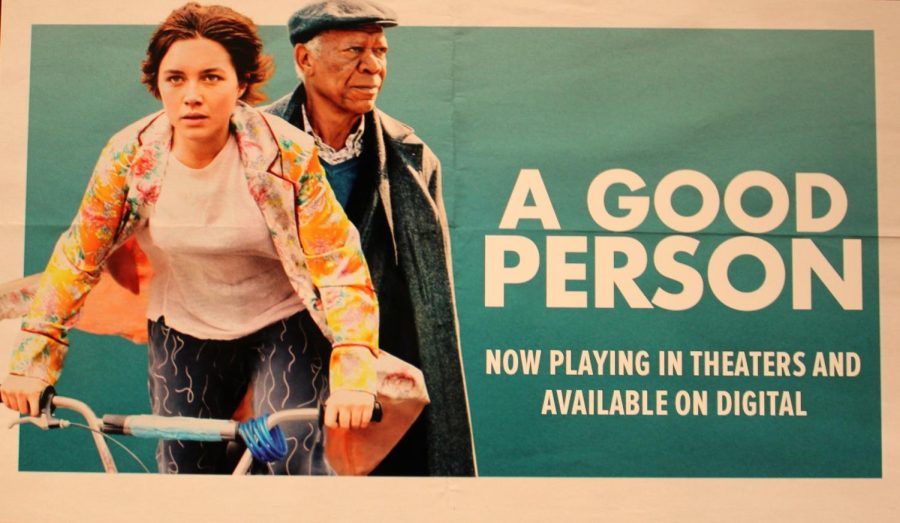‘A Good Person’ balances entertainment, emotional dread
A screenshot of the movie poster for “A Good Person.” The film is now in theaters and stars Florence Pugh and Morgan Freeman. (Nyla Owens | Northern Star)
April 18, 2023
Editor’s Note: The following piece contains spoilers for “A Good Person,” which is currently in theaters.
Don’t ever underestimate the value of a good tearjerker … keyword: “good.”
“A Good Person,” the new film from actor-turned-filmmaker Zach Braff, may at first repel those who have a distaste for sappy, overly emotional melodramas. But the film mostly distinguishes itself from schlocky Hallmark movies and teen-oriented John Green adaptations, proving there is art and substance to be found within the tearjerker genre.
The film follows Allison (Florence Pugh) as she struggles with grief, addiction and guilt after her future in-laws were killed in an accident that occurred when she was behind the wheel. In a chance encounter with her former fiance’s father, Daniel (Morgan Freeman), at an addiction support group, the two reluctantly begin an unexpected friendship.
While the film is filled to the brim with meaning and raw emotion, it feels a little familiar at times. Braff, the former “Scrubs” star who first gained recognition as a director with his directorial debut “Garden State,” seems to be drawing heavily from his first film.
“Garden State,” released in 2004, follows Braff’s character as he embarks on a journey of grief, guilt and forgiveness in his hometown. While the two films are different enough that I can’t reasonably accuse Braff of plagiarizing his own work, it is rather disappointing that he hasn’t progressed or branched out all that much in the nearly 20 years since he began making films.
Familiarity aside, “A Good Person” provides a competent, though sometimes predictable, portrayal of grief and addiction. Pugh gives a natural and believable performance, and Freeman reminds viewers of what he’s capable of after years of roles in lackluster films like “The Comeback Trail” and “The Nutcracker and the Four Realms.”
The film constantly teeters between feeling like one of the aforementioned Hallmark movies and a serious indie drama, making the tone of the film noticeably inconsistent. The ending falls into place too convenient to be plausible, leaving behind the circumstances and emotions established in the prior two hours in an unsatisfying way.
The overall nature of the film makes it difficult to get through. While it’s not high art, it isn’t light, frivolous entertainment either. If Braff’s goal was to make the audience feel an intense wave of emotions over the course of two hours, he succeeded. The melancholic dread present in the film immersively throws the viewer into a pit of grief and despair and will leave you feeling like you’re the one grieving.
While the film is well-paced, the dialogue often feels forced and unrealistic; the characters have a tendency to speak in an unnatural way that doesn’t feel like it reflects real life at all. For example, many of the scenes with Daniel’s 16-year-old granddaughter Ryan (Celeste O’Connor) feel as though they were written by someone who hasn’t met a teenage girl since the early ‘90s. Her dialogue makes her feel like an inaccurate representation of a modern teenager, making the film feel out of touch at certain points.
Though he doesn’t seem to have reached his peak yet, Braff’s talent as a director is undeniable. Despite the occasional clunkiness of the script, he has an uncanny ability to elicit authentic emotional responses out of his actors that, in turn, will elicit emotional responses from viewers.
“A Good Person” is far better than it should be. Braff took a plot that feels like it was pulled from a ‘90s made-for-TV movie and turned it into a tasteful and elegant meditation on loss and recovery.







